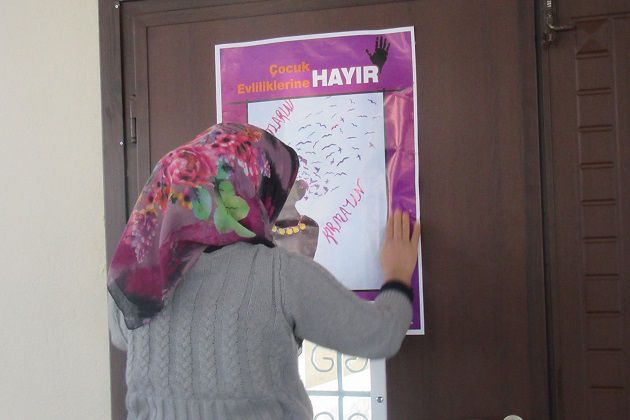The 15-years old Derya B. died in October 2016 shortly after giving birth to her first baby. Two underage mothers in Diyarbakır and two others in Muş recently died during labor. All those girls were child brides, who have been married long before they reached adulthood, children that suffered from directly related consequences such as sexual abuse.
Early marriages are one of the bleeding scars in a lot of regions of Turkey particularly in East and Southeast Anatolia. The country has one of the highest rates in Europe with an estimated 15 percent of girls married before the age of 18 - while the mean age is 27.1 years for males and 24 for females. The Turkish Statistical Institute (TurkStat) recently released a Family Structure Survey stating that in 2016 17.9 of all first marriages took place before the bride had turned 18. This is almost every fifth wedding. Other experts estimate the number to be even higher with one third of all marriages being child marriages and one third of women getting married under the age of 18. Nevertheless, both data sets may not be representative due to the fact that most of these weddings are performed by religious authorities, such unions are neither recognized nor registered officially. One thing is certain, though: Child marriages affect girls about 20 times as much as they do boys. In 2016, while the age at first marriage was 28.2 percent for women under 18, for men it was 5.6 percent.
What are the reasons that the number of child marriages is still that high in Turkey, a country which, based on its total GDP ranks among the 20th most developed countries in the world, directly behind the Netherlands? Even in the United Nations Human Development Index, a more comprehensive listing that takes into account statistics such as those on gender parity, the country still finds itself among other states with a high human development ranking.
One the one hand, there are social drivers like the male-dominated atmosphere in Turkey where girls and women are only seen as wife and mothers. Other reasons are high levels of violence against women as well as low school attendance and therefore low education levels for girls. Economical hardships are often drivers for early marriages as well. Poorer families are often keen on reducing costs, by marrying away their daughters. The structural gaps in the Turkish system such as the poor birth registration add to the problem. Current regional events have increased the problem as well: with the high number of refugees in the country, underage Syrians are especially prone to early marriage. As the war in Syria continues, the use of child marriages comes as an economic coping mechanism for many families. While traditions might also play a role, for many refugee families it is also seen as a way to protect their daughters from sexual assault. Therefore in host countries like Turkey, Lebanon or Jordan child marriages are gaining ground.
For all these reasons the high rate of child marriages is so to say a mirror of the current political and social situation in the country. In November 2016, the Turkish government had tabled a bill which proposed that men previously convicted of child abuse could be exonerated if they married the girl. The Turkish government claimed that the rationale behind the bill was to avoid cases in which young men over the age of 18 were sentenced to prison terms because they had consensual sex with minors who were only slightly younger than them. However the law would have potentially opened a loophole for real abuse cases as well. After a public outcry from the AKP's own women organization, President Erdoğan intervened and stopped the bill.
Child marriage is prohibited in Turkey. Since 2001, the Civil Code has a specific clause outlawing forced as well as underage marriage, by which the legal consenting age is stated to be 18 for men and women. Before this, it was 17 for men and 15 for women. Although illegal, child marriage in Turkey still remains prevalent.
The official numbers underline that there is a problem: In 2016, 35 percent of all births were by mothers that became pregnant before the age of 18, according to the Ministry of Health . 2.404 babies that have been born to girls under the age of 17 have died over the past 11 years in Turkey.
But the will of politics and civil society to fight this phenomenon is growing. The Family Ministry recently launched a counter-strategy for the most affected regions. Headed by the ministry, the Family Directorate of Diyarbakır wants to raise the awareness of 130.000 people per month that early marriage is a physical and psychological threat to children.
Not only the government but local organizations as well have taken first steps against child marriage. The women's organization YAKA-KOOP launched the ' No to Early Marriages Project' in the province Van that is financed by the Heinrich Böll Foundation. Among other actions and cooperations with doctors and imams, they conducted surveys. One of the results of those surveys was that every second interviewee was a child bride and most of them considered it as being 'normal'. But YAKA-KOOP's work has already shown impact: After one of the awareness-meetings, a woman said: "We used to believe that we came into the world to give birth, cook, wait for our husbands at home, wait for them to give us money and we thought it's our destiny. But from today on, I won't believe that that is true".


